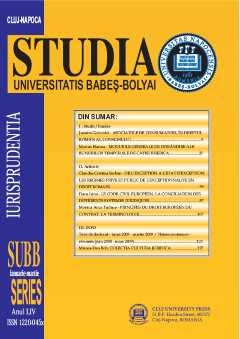CHALLENGES OF THE NEW FAMILY ACT OF SERBIA ESPECIALLY IN THE FIELD OF ADOPTION
CHALLENGES OF THE NEW FAMILY ACT OF SERBIA ESPECIALLY IN THE FIELD OF ADOPTION
Author(s): Olga Cvejić JančićSubject(s): Law, Constitution, Jurisprudence
Published by: Studia Universitatis Babes-Bolyai
Summary/Abstract: This paper deals with the most important changes which have been made in the new Family Act of Serbia which was promulgated in February 2005 and which has come into effect on July 1st 2005. Special attention was paid to adoption in order to explain one very important institution - the protection of children without parents or parental care. In marital law, one of the changes was the elimination of obligation of mutual faithfulness between the spouses, then changes regarding the provisions on divorce. Causes for divorce have remained the same: breakdown of marital relations and divorce by mutual consent. In the latter case, the consent is not merely an agreement on the exercise of parental rights (which can now be realized as joint exercise - joint custody), but implies the division of joint property as well. Certain novelties have also been made by introducing mediation in family law proceedings in order to try to resolve marital problems and conflicts after divorce or annulment of marriage by alternative dispute resolution processes as alternatives to judicial or administrative proceedings. The new law has introduced marital contract as a completely new institution, then it has equalized non-marital and marital cohabitation and made some changes concerning the obligation of maintenance support. There is a new provision which determines the minimal amount of maintenance support by establishing that it is equal to the compensation given to a foster child, which is periodically determined by the Ministry for Family Protection. The maintenance creditor can choose whether the support will be determined as a fixed monthly rate or percentage-wise with respect to regular monthly income of the maintenance debtor. In case he or she opts for the latter, alimony support can be between 15 and 50%.
Journal: Studia Universitatis Babes Bolyai - Iurisprudentia
- Issue Year: 50/2005
- Issue No: 2
- Page Range: 17-26
- Page Count: 10
- Language: English

